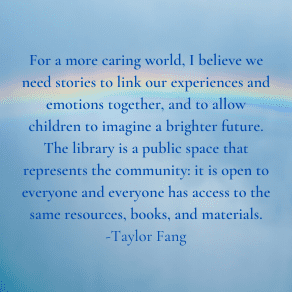
There are three doors that slide open with jerks, like zippers on thrift store jackets, revealing book displays and yellow circulation pencils. Since elementary school, I’ve entered the doors to my local city’s public library countless times. Growing up, I never saw my parents reading. As first-generation immigrants, they said they didn’t have time. But I was lucky: my mom drove me to the library and helped me carry my heavy book bag to the car.
Spending hours at the library taught me the power of storytelling. Writers like Maya Angelou and Toni Morrison not only gave me companionship, but pushed me to empathize with others. Stories inspire us to step into new perspectives and reveal our common experiences—across race, class, and gender.
However, not all children have opportunities like I did to explore and learn at the library. In the United States, many public libraries don’t have adequate resources to reach underprivileged kids. Around the world, public libraries are rare, especially in developing countries. I remember visiting my parents’ hometown in China, and seeing that even textbooks in schools were sparse and prized. I believe in Nelson Mandela’s quote that “education is the most powerful weapon which you can use to change the world.” To make a change for children, I hope to focus on increasing access to public libraries and to combat educational inequality in my community.
Increasing library access can take several forms. In the past, I’ve participated in book drives and donations of gently-used books. I’ve been part of “mini-library” projects which share books locally in new ways. For example, my neighborhood has a “book mailbox“ which allows kids to check out, return, swap, and replace books. Bookmobiles are ”traveling libraries“ (a collection of books in a van or bus), that can reach rural areas and more diverse communities. If we come together to support mini-library projects like these, more children of all backgrounds can have the chance to experience the magic of reading.
Recently, I’ve also become interested in digitizing library materials so they can be accessed online. In the current COVID-19 crisis, I’ve learned that many universities and publishers have stepped up to offer free e-books to the public. The Internet Archive, for example, is a digital library of thousands of free and borrowable books. I’m inspired by programs like this, which allow students to continue learning at home and to keep up with their classmates. Some children might not have access to a physical library but can read books and newspapers digitally. I believe sharing stories can further allow communities to feel solidarity and find hope during these difficult times.
I’m especially passionate about digital education because I’ve seen the expansive impact it can make. My freshman year of high school, I attended an all-girls summer technology camp. While there, two other campers and I noticed that we were the only students from rural areas. To share technology and coding resources with more diverse girls, we started a blog called Allgirlithm (allgirlithm.org). Allgirlithm has since grown to reach chapters in 62 locations across 8 countries! Although Allgirlithm doesn’t focus specifically on libraries, it’s shown me that resources and learning can be shared widely through online platforms, and impact youth in new ways. In the future, I hope to continue using the internet as a powerful tool for increasing access to education around the world.
Finally, I believe that education is not just about memorizing facts and numbers, but about unlocking imagination and creativity. Children of all backgrounds should have the chance to explore and tell stories. My personal goal is to share libraries with more students, and to further integrate creative writing. Writing poems and stories can be a voice for self-expression and advocacy, and a platform to explore lived experiences, home, family, and heritage. I hope that students who write their own books can build their own mini-libraries in the future!
For a more caring world, I believe we need stories to link our experiences and emotions together, and to allow children to imagine a brighter future. The library is a public space that represents the community: it is open to everyone and everyone has access to the same resources, books, and materials. Through the foundation of strong libraries, we can build a more peaceful and empathetic society, where bridges are built across borders and conflict. Together, we can build a world where all children are given equal opportunities to learn, to discover, and to read.
